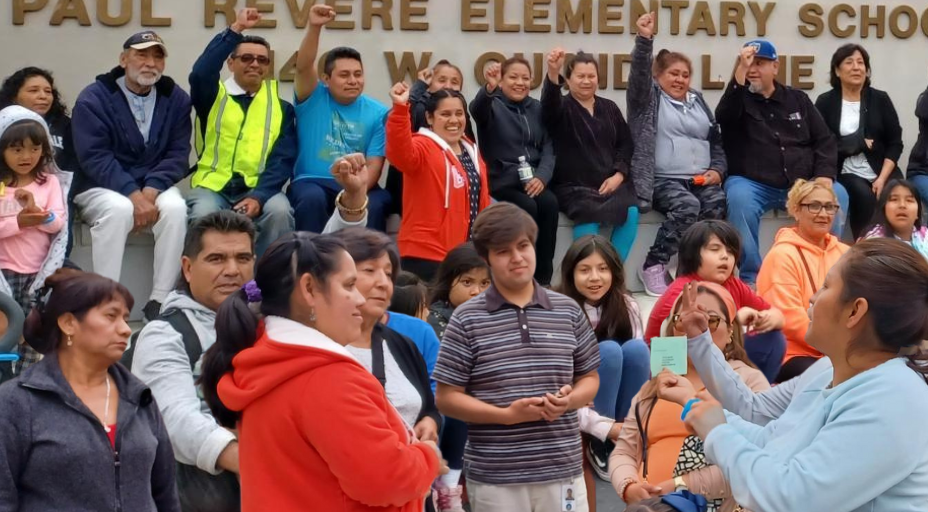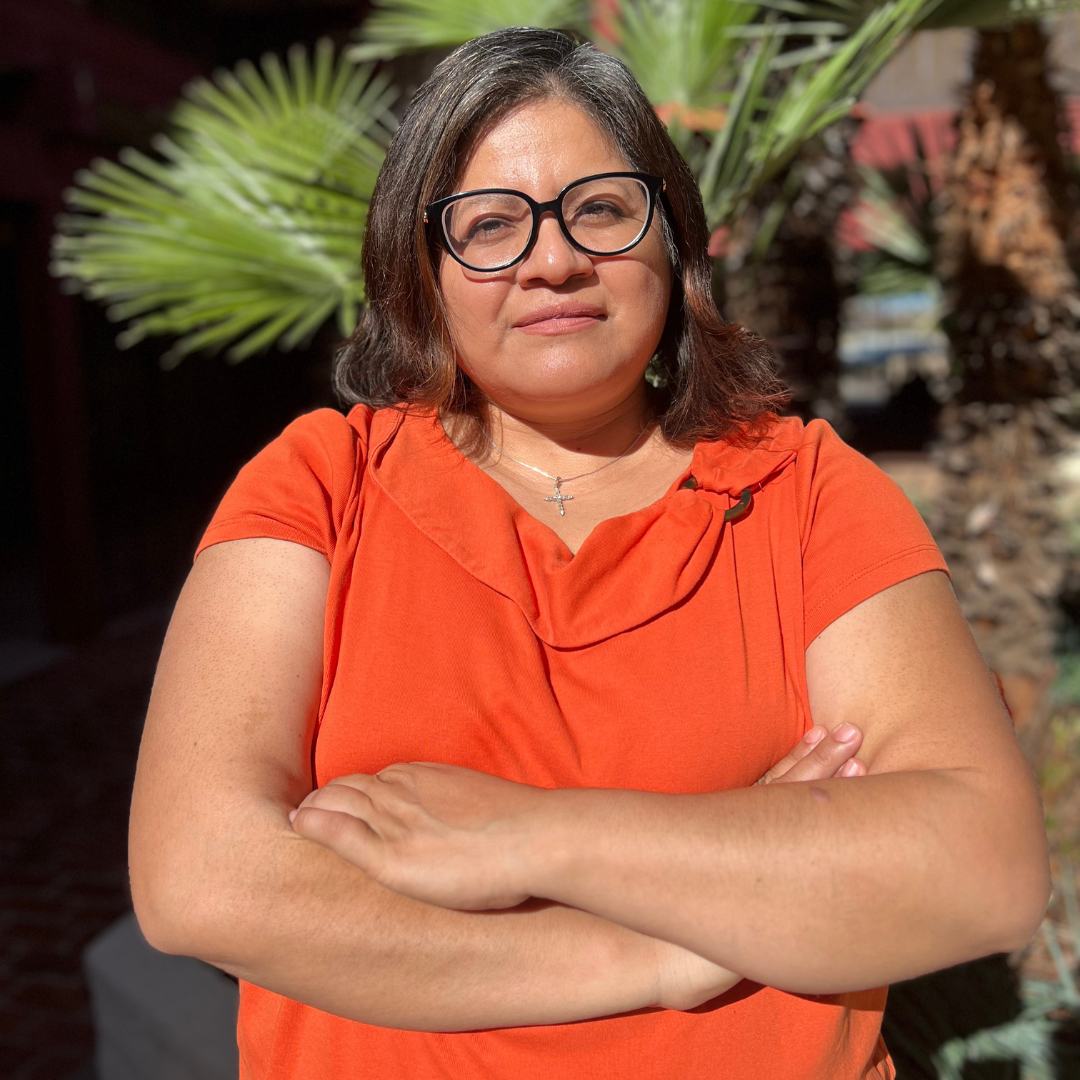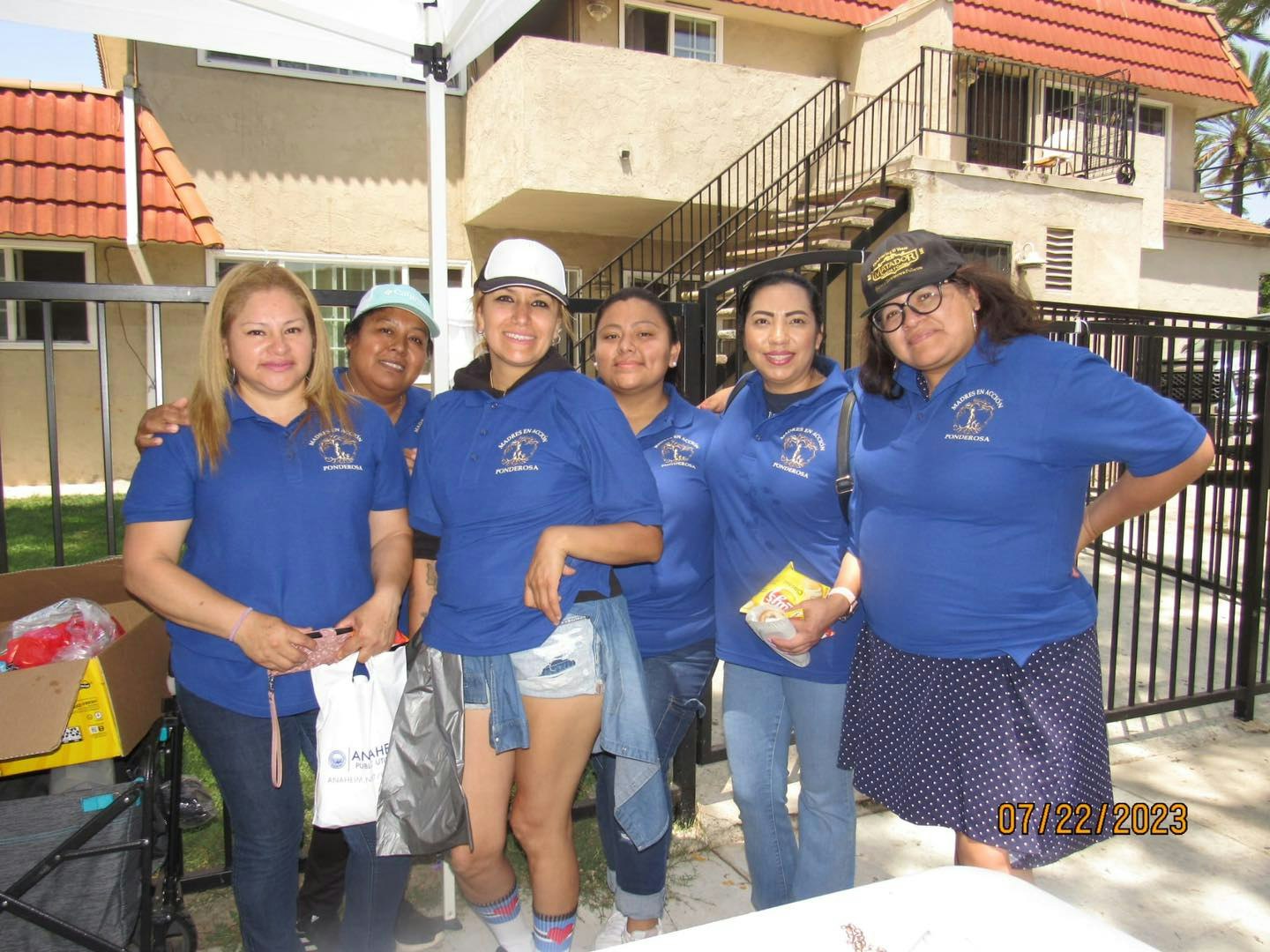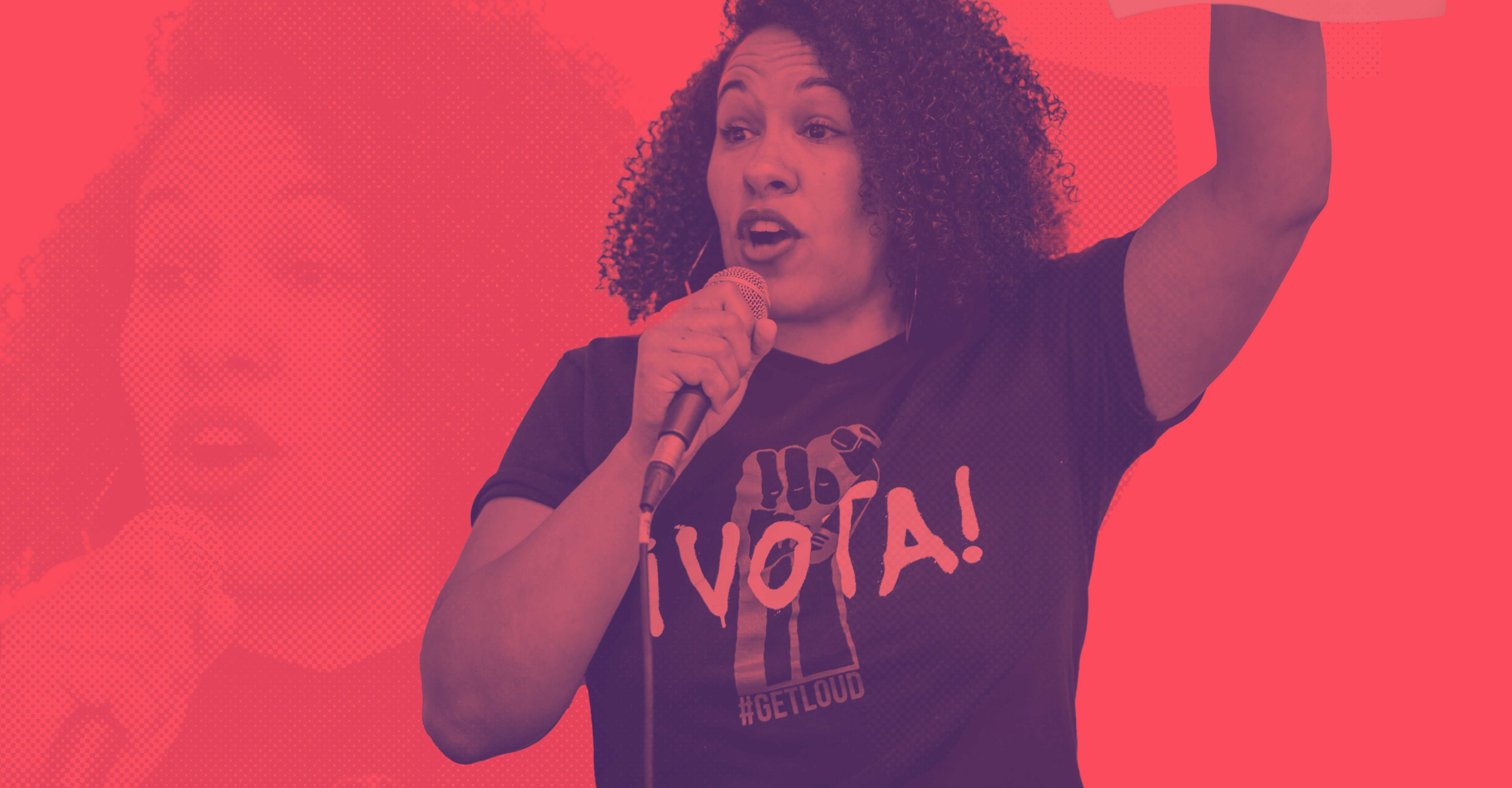Read this article in Spanish | Lea este artículo en español.
For over a decade, our affiliate Orange County Communities Organized for Responsible Development (OCCORD) has been experimenting with a bold method of building organized people power in the region. Neighborhood unions are not as widespread or well known as labor or tenant unions, but they are a potent way for everyday people to join together and address issues in their communities, ranging from tenants rights and development projects to green spaces and public safety. This past month Alonso Hernandez (Creative Lead at PowerSwitch) spoke with Mariana Angeles (Community Organizer at OCCORD) about how OCCORD is seeding and supporting neighborhood unions across Orange County, California.
Alonso Hernandez: Thanks so much for joining us today, Mariana! We’re really excited to learn more about neighborhood unions and how you have been organizing with communities in the region. First, can you tell us what brought you to OCCORD and this work?
Mariana Angeles: I started volunteering with OCCORD in 2007 around the time of their Platinum Triangle Campaign, which focused on a community benefits agreement to cover the high-cost redevelopment of the Platinum Triangle District in Anaheim. At the time, the city wanted to encourage high-density, mixed-use developments and granted over a dozen projects in two years. OCCORD, partner groups, and residents saw these plans for what they were: a future where they would be priced out of their homes and neighborhoods. Yet, in an attempt to fast-track an additional expansion plan, the city violated a municipal code and a state law. OCCORD and another group each filed a lawsuit that then allowed residents and surrounding communities to weigh in on the development projects. It was an awakening for me. After that, I helped found a group called Madres en Acción Ponderosa. During the pandemic, we collaborated with OCCORD around vaccine information and access, as well as with other organizations to provide food and other supplies to communities in Ponderosa. Since then, Madres has been advocating for improved housing conditions, an issue that deeply resonates with me. I have witnessed it firsthand with my own children and within my broader community, where many of my neighbors navigate life on a paycheck-to-paycheck basis. So, fighting for housing justice holds personal significance for me, my children, and our community at large.
Alonso Hernandez: Thanks for sharing that, Mariana. Can you share how neighborhood unions fit into the fight for justice?
Mariana Angeles: OCCORD first explored the idea of organizing neighborhood unions back in 2010. We basically took the concept of a labor union and implemented it on a community level. A neighborhood union is composed of people who live within the community and possess a deep understanding of their problems and needs. I currently work in Anaheim where there are three operational neighborhood unions, and we are in the process of forming another one. We offer workshops focused on tenants' rights, the latest laws that are in effect in the region, and in some cases we connect members with other organizations capable of offering legal support.
The strength of organizing through a neighborhood union is that it is more comprehensive—it encompasses a multitude of aspects. If we have a union dedicated solely to one thing, like housing, our efforts are concentrated solely in that area. This isn’t a bad thing. However, a neighborhood union can address a broader range of a community’s needs: living conditions, green spaces, public safety, and more. This also creates the opportunity for collaboration on a wider range of issues.
Alonso Hernandez: Thanks for that background, Mariana. I know that the Pauline Street Neighborhood Union has been very active in the past few months. Can you tell us more about it? What was the process like forming that union? What are some of the shifts or wins that you’ve seen in that neighborhood as a result?
Mariana Angeles: Pauline Street is an area that has been historically overlooked by its elected representatives for a number of reasons. The majority of residents are Hispanic or Latino immigrants, they are primarily Spanish-speaking, or they don’t speak English at all. They work paycheck-to-paycheck to put food on the table. The least of their concerns is getting to know their representatives. Some residents may vote, some may not be registered to vote, and others might be ineligible to vote altogether. So they may not seem like an important constituency to an elected official. Yet the Pauline Street community still faces the same issues and has the same, if not more, needs as other communities.
OCCORD first crossed paths with a few Pauline Street residents at a city council meeting where they were raising concerns about their landlord's negligence in maintaining the apartments they rented. There were rat and cockroach infestations, and the residents felt helpless because no one seemed to be listening to them. They felt intimidated by the landlord, who was a lawyer and often boasted about his connections at City Hall, and many of them believed they had no rights and feared retaliation. That was when OCCORD reached out to them, listened to their concerns, organized workshops on tenants' rights, and facilitated connections with lawyers to assess the legal options. Together with lawyers and partner organizations, we helped the residents win repayment for unlawful rent hikes. That experience really built up the faith and confidence of the Pauline Street residents—they could see that by working together, they could win.
Earlier this month, after weeks of coordination and communication, the Pauline Street Neighborhood Union welcomed their councilwoman Natalie Rubalcava on a tour of the neighborhood. While they walked, members were able to express their concerns openly, articulate their needs, and discuss how the councilwoman would engage with them. They raised issues like improving poorly lit streets, pruning overgrown trees, and promptly removing trash. While these types of changes may seem mundane or small, they are essential to the health and wellbeing of a community, and they affirm the power that everyday people have to make decisions, hold their leaders accountable, and see those changes reflected in their neighborhood.
Alonso Hernandez: That’s really powerful, Mariana. What do you believe could be accomplished if more neighborhoods began organizing and forming unions?
Mariana Angeles: Take the Ponderosa Neighborhood Union as an example: they have evolved into a significant political identity. Councilors and potential candidates for the district position make a point to visit, engage with residents, and be present in that area. The Ponderosa NU has built up power so that they can call up their councilman—and their councilman will show up. If they want a meeting with a specific city department, then those people will show up. There have been significant changes in that community, like improvements to the streets and even new street signs. Before the union, getting a simple “School Zone - Drive Carefully” sign was a challenge for Ponderosa residents. It seems like a small win, but you can really see the political and community impact. The Ponderosa NU now has credibility among their neighbors and their elected officials, and they have gained that by demonstrating their commitment to issues like education, equitable employment opportunities, and access to healthcare. So, yes, we have seen firsthand how organizing a neighborhood union results in increased visibility for residents, greater political power, and access to substantial resources and connections that can help ensure their communities thrive.
Alonso Hernandez: Wow, it’s so exciting that people are able to see the power of a neighborhood union and want that for themselves and their communities. If folks are interested in joining a neighborhood union or if they want to start one in their own neighborhood, what are the steps they should take?
Mariana Angeles: First, talk to your neighbors! Figure out if there is a union or another organizing body that already exists. If there isn’t, then the first step is to get to know your neighbors: talk to them, understand their concerns, and where they are coming from. If you’re in Orange County, you can contact OCCORD, but you can also look for similar community organizations in your area that can offer workshops, resources, or recommendations for things like crafting an agenda and conducting meetings effectively. That's what I recommend: get to know your neighbors, seek out organizations, educate yourselves, and remember that unity is strength.
Alonso Hernandez: Thanks, Mariana. Do you have any final thoughts you’d like to share?
Mariana Angeles: When I took on this job, I had no prior experience organizing communities, but I did have a dream. My dream is to shed light on those of us who have been overlooked so that the city and our elected leaders can genuinely represent us and facilitate meaningful change. We're experiencing significant challenges in education, the cost of rent is skyrocketing, there are substantial cuts to park resources, and we lack access to decent medical care. This is my job, but these issues are very personal to me. There's a lot of work to be done, but this is my contribution. I want neighborhood unions to recognize their own strength, their own talent, and know that together we can make change.



